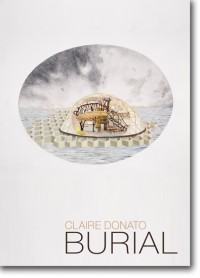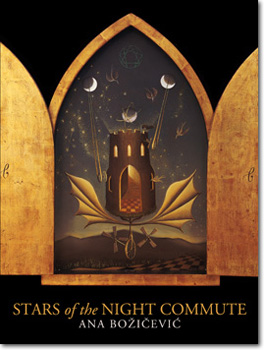25 Points: Burial
 Burial
Burial
by Claire Donato
Tarpaulin Sky Press, 2013
104 pages / $14.00 buy from Tarpaulin Sky
1. For reasons both Biblical and practical, we must “let go the dead.” But “persons never completely let go the dead.”
2. The main characters of Donato’s debut never leave the side of the dead. Father, dead, belongs here. The unnamed woman is describing as checking-in to the morgue. She’s there to stay, also, for a while.
3. Burial is concerned with the strangeness of death, something lost in its ubiquity, until we see it close. At another funeral near the start of the book, the congregation is described as “yawning, unable to recognize the weight of the ghost.” Mouths open, they might as well have been singing.
4. Donato’s heavy usage of commas, in the vein of Peter Markus (We Make Mud) and William Gass (“The Pedersen Kid”) before her, is almost a way of stalling all death.
5. Father is dead. His capitalized self stands like a tree amongst the brush of other words.
6. “Father was a man. He taught lessons in his language, and also raised his voice. ‘A lovely day to go fishing,’ he said. ‘The water is frozen,’ he said. Then he drowned in the lake.”
7. Burial is a grief-dream, an attempt to un-sew pain from experience and to reveal it in language.
8. “Mind’s a confused, tangled skein.” Particularly when it is pulled by pain.
9. “And the doe—the poor, female doe—collapsed at the scene. Two cracks rang out. He shot her. He shot her dead. ‘A lovely day to go fishing,’ he said, yet before he could indulge in his reward—field dress the damn deer and pay tribute to his success, his all-time best, grand aptitude for chase—he drowned in the lake.” Father’s final moments return, as grief does, often in different permutations. What’s the point of language if it can’t unmake and remake?
10. There is the woman, and Father, and Groundskeeper, who “kneels beside her bright yellow bucket,” and is the keeper and cleaner of these dead. READ MORE >
July 11th, 2013 / 12:09 pm
Stars of the Night Commute by Ana Božičević
 I.
I.
Beginning
There is a small world nestled in a big sky. The small world has its own sky, land, people, animals, etc. etc., and although the world is small, if you take the world’s train, you begin to see that the world is vast, because the train travels a meandering route in a hypnotic motion.
We get on this world’s train when we read Ana Božičević’s book, Stars of the Night Commute. The passengers are intimates, yet they are covered with a film of remoteness, and the commute at times bores through this remoteness, and at other times travels the periphery. The abiding mystery of this commute is presented through lines in an early poem, “Always the beast has a remote heart.” And then at the end of the same poem, “At the end of poetry the poem can no longer be remote.” This tension between remoteness of the beast’s heart and intimacy of the poem’s heart causes the whole of the book to ache in the way of a taut muscle stretching to span these disparate realms.
How do we get from point A to B when we are involved in the physics of a dream? Is there a point A and point B in the physics of a dream? In the Stars of the Night Commute, there is a starting point, where the window is opened and air flows in. And, at the end of the book, is the closed and summerless room. But, the route between the two also climbs and descends, skips and glides, as we are woven through memory’s scaffolding. And, on this same variegated route, we are led round and round the circular path, an endless mulling that causes a thought to be worn down to a “white pebble.”
October 12th, 2010 / 3:09 pm
